Today, as new democratic movements gather strength elsewhere in North Africa and Tunisia prepares for a presidential election on Sunday, the country’s role as a showcase for democracy in the volatile region is being tested, The Wall Street Journal reports:
The race has been beset by controversy and surprises. The apparent front-runner, a media mogul, was jailed in August in a disputed tax-evasion case but remains on the ballot. The late president’s conservative party has splintered in a rivalry among its former leaders, while the country’s leading moderate Islamist party put forward a nominee for the first time. Two dozen candidates are contesting the wide-open race, including remnants of the old autocratic regime and Tunisia’s first openly gay candidate.
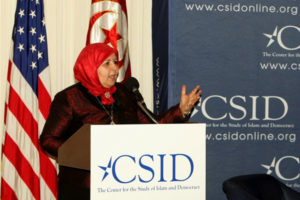
CSID
“Success isn’t in the outcome of the election,” said Abdel-Fattah Mourou, a moderate Islamist member of parliament and lawyer who is one of the leading candidates. “Success is that the election is happening.”
Tumult
Tunisia’s own democracy has been tested before. In 2013, the assassination of several secular leaders, allegedly by Islamists, triggered protests and militant attacks on police. Civil society groups joined forces to unite the battling factions, actions that garnered them the 2015 Nobel Peace Prize, The Washington Post adds.
“In a region where democratic behavior is in short supply, Tunisia has an outsized impact,” said Daniel Twining, head of the International Republican Institute, who is here with a team of observers to monitor the vote. “Tunisia’s example can be a source of inspiration if their democratic institutions remain resilient and lay the foundation for a more stable and prosperous country.”
“There’s quite a lot of tumult,” he added. “Citizens are highly dissatisfied and disaffected by dictatorial rule,” he told the Journal.
 Democracy is being challenged all over the world, and nowhere is the resistance greater than in the Middle East. But the battle goes on – it didn’t end with the crushing of uprisings of the Arab Spring everywhere but in Tunisia. People are still fighting because the status quo is not viable, according to Carl Gershman (left), President of the National Endowment for Democracy.
Democracy is being challenged all over the world, and nowhere is the resistance greater than in the Middle East. But the battle goes on – it didn’t end with the crushing of uprisings of the Arab Spring everywhere but in Tunisia. People are still fighting because the status quo is not viable, according to Carl Gershman (left), President of the National Endowment for Democracy.
The last two Arab Barometer surveys report a strong – and growing – acceptance of democracy as the best type of government. Another study conducted five years after the Arab Spring found that eight-in-ten Arabs consider democracy the best political system, he told the 20th Anniversary Conference of the Center for the Study of Islam and Democracy:
- The reason for this is obvious, and this is the first lesson: people don’t like corruption and unaccountable government. They want freedom and respect for their human dignity. That’s why people rose up against the Bashir regime in Sudan last December, and against the Bouteflika regime in Algeria last February….
- Almost a decade after the abortive Arab Spring, the potential for rebellion against repressive and unaccountable rulers in the Middle East is as great as ever. But so is the resistance to democratic change, and this is the second lesson. Led by China and Russia, and increasingly by the Gulf States and Iran as well, authoritarian countries are engaged in a concerted effort to contest democracy. They constitute a kind of de facto authoritarian international. ..
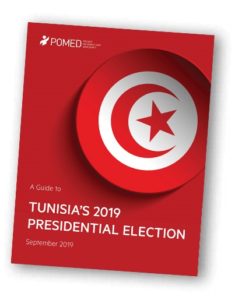 The authoritarian international needs to be countered by a democratic international – a coalition of democratic governments and organizations committed to defending democracy and the people fighting to achieve it. But no such coalition exists, and this is the third lesson – the West is largely absent when it comes backing democracy in the Middle East. …… As Anne Applebaum wrote recently in The Washington Post, there is a crisis of Western values that has manifested itself in “a decline in faith in liberal democracy, a loss of confidence in universal human rights, and a collapse in support for all kinds of transnational projects.” …
The authoritarian international needs to be countered by a democratic international – a coalition of democratic governments and organizations committed to defending democracy and the people fighting to achieve it. But no such coalition exists, and this is the third lesson – the West is largely absent when it comes backing democracy in the Middle East. …… As Anne Applebaum wrote recently in The Washington Post, there is a crisis of Western values that has manifested itself in “a decline in faith in liberal democracy, a loss of confidence in universal human rights, and a collapse in support for all kinds of transnational projects.” …- From Iraq to Indonesia, Saudi Arabia’s Wahabbists and similar extremist ideologues are spreading a rigid, literalist interpretation of Islam that is “rejected by the vast majority of Muslims and imposed on them,” as the former Islamist radical Ed Husain argues in a recent new book, The House of Islam. The battle of ideas, he contends, is not between the West and Muslim communities, but within Islam itself. And this is the fourth lesson: the battle of ideas goes on in the world between democracy and authoritarianism – it didn’t end with the Cold War – and nowhere is it more acute than with respect to the battle within Islam. The malign influence stems not only from autocratic regimes, of course, but also from the ideological contamination of extremist movements, which cannot be defeated by a purely security-based strategy. …RTWT

POMED
Despite all the similarities and Sudan’s inspirational potential, there are profound differences between Sudan and Algeria, says Middle East expert Rachid Ouaissa. For example, the Algerian opposition “is much more disparate than the Sudanese. Also, the army has managed to poach a portion of the opposition.” The fact that the Algerian opposition is rejecting all outside intervention is also a problem. The Sudanese breakthrough was only achieved through foreign mediation. Negotiations were supported by Ethiopia and the African Union.
Fundamental differences in the history and structure of the two nations’ armies are also significant, he tells Qantara: “Firstly, the Algerian army was legitimised through a revolution. Secondly, it is highly present in society.” Enjoying the support of Saudi Arabia and the UAE, the Algerian military also maintains ties with the West, playing a strategically relevant role in the Mediterranean region and Africa.
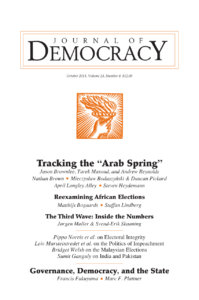 We Live in Cairo (below), a musical set during the 2011 Tahrir Square protests, demonstrates the depth and durability of the democratic yearnings that young people in the Arab world feel, says Tarek Masoud (above, left), professor of public policy and Professor of International Relations at Harvard Kennedy School.
We Live in Cairo (below), a musical set during the 2011 Tahrir Square protests, demonstrates the depth and durability of the democratic yearnings that young people in the Arab world feel, says Tarek Masoud (above, left), professor of public policy and Professor of International Relations at Harvard Kennedy School.
Even as Egypt has retreated toward authoritarianism, “the desires and passions that created that dramatic revolution still exist, and they remain unfulfilled,” says Masoud, a contributor to The Journal of Democracy. “Many around the world have come to view the so-called Arab Spring as a failure and have written off the prospects for Arab democracy. We Live in Cairo reminds us that the Arab Spring was a process, that it is still ongoing, and that the people who sparked it are not going away.”
Most elections since Tunisia’s revolution have led to power-sharing agreements between the rival parties, as politicians sought to avert dangerous polarization between Islamists and liberals or to present a united front to deal with economic crisis, Reuters reports. It is uncertain whether that consensus model will continue. Sunday’s election may push parties to stake out harder positions in the October parliamentary elections against sharing power with ideological opponents.
From consensus to uncertainty?
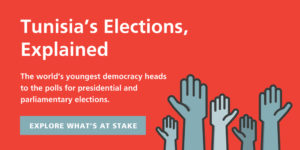
Carnegie
The tenor of Tunisia’s election season suggests that its democracy may be transitioning from a period of relative consensus to something far less certain, argues Sarah Feuer, an associate fellow with The Washington Institute:
Indeed, the election has underscored the price of Tunisia’s post-2013 political stability: namely, growing discontent among an electorate keen to see democracy deliver not only individual freedoms, but basic economic dividends as well. Whoever wins the vote may feel liberated from the years of stagnant elite consensus, but the new president will also face an increasingly restless public, profound fiscal challenges, and a tenuous security situation.
This predicament highlights the necessity of continued American assistance, especially in the economic and counterterrorism realms, she adds. Washington has a keen interest in ensuring that Tunisia remains not only a democratic success story, but also a strategic ally in an unpredictable neighborhood.
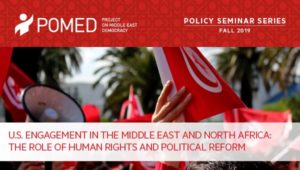 Tunisia’s peaceful handover of power, the wide range of candidates and positions, the televising of debates, and genuine uncertainty about who will win are all positive signs. At the same time, worrying undercurrents are evident – reflecting broader challenges in democracies around the world, Lowy Institute analyst Merriden Varrall adds:
Tunisia’s peaceful handover of power, the wide range of candidates and positions, the televising of debates, and genuine uncertainty about who will win are all positive signs. At the same time, worrying undercurrents are evident – reflecting broader challenges in democracies around the world, Lowy Institute analyst Merriden Varrall adds:
Tunisians are largely disillusioned by politics, parties, and politicians. They don’t see their lives improving. The intense rivalry and inflammatory rhetoric among candidates – not to mention the arrest of several of them – suggest a political environment in which politicians are less focused on maintaining and strengthening democratic institutions, and more focused on simply winning, including by digging up whatever dirt and prising open any cracks they can use to their advantage.
 The Project on Middle East Democracy announces an eight-week evening seminar on U.S. Engagement in the Middle East and North Africa: The Role of Human Rights and Political Reform, led by POMED Deputy Director for Policy Andrew Miller and geared toward young professionals in foreign policy, NGOs, research institutes, journalism, etc.
The Project on Middle East Democracy announces an eight-week evening seminar on U.S. Engagement in the Middle East and North Africa: The Role of Human Rights and Political Reform, led by POMED Deputy Director for Policy Andrew Miller and geared toward young professionals in foreign policy, NGOs, research institutes, journalism, etc.
Full course description available here.
Tuesdays from 6:00pm – 7:30pm. October 1 – November 19.
POMED, 1730 Rhode Island Avenue NW, Suite 617, Washington, DC 20036.
COST $280
APPLY HERE: Seminar space is limited and admission is selective. Please apply no later than Monday, September 23, 2019. Preference will be given to early applicants.







